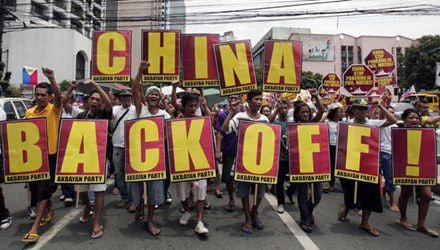Philippines steps up legal fight against China
On July 13 in The Hague (Netherlands), the Philippine delegation answered many questions from the Permanent Court of Arbitration at the second hearing on China's "nine-dash line" lawsuit in the East Sea, reported PhilStar.
 Filipinos protested demanding that China leave waters claimed by Manila. Photo: Getty Images Filipinos protested demanding that China leave waters claimed by Manila. Photo: Getty Images |
Philippine presidential spokesman Edwin Lacierda expressed hope that Manila would win a favorable ruling from the arbitral tribunal. A delegation of senior Philippine government officials attended the hearing before the tribunal. Lacierda said their attendance represented “a unified position in support of the country’s claim under the 1982 United Nations Convention on the Law of the Sea (UNCLOS).”
In his speech before the court, Philippine Foreign Secretary Albert del Rosario stressed the importance of the case to the world, highlighting the core spirit of UNCLOS and its possible relevance to the settlement of future maritime disputes.
Philippine Chief Counsel Paul Reichler and others then presented their case for why the court has jurisdiction over the case, as well as raising fishing and environmental claims against China. The Philippines is seeking to clarify its maritime sovereignty and invalidate China’s baseless claims to virtually the entire South China Sea.
Last week, Foreign Secretary Del Rosario told the court that China has no right to exercise what Beijing calls “historic rights” over waters in the South China Sea; the “nine-dash line” has no basis and is not based on international law. Mr. Del Rosario also stated that China’s massive reclamation, artificial island building and dangerous fishing have seriously damaged the regional marine environment, violating UNCLOS.
The Philippines is also considering asking the court to order China to stop its land reclamation activities in the South China Sea. In addition to rejecting China’s “historic rights” and “nine-dash line” as baseless, the Philippines also denies China’s sovereignty over the artificial islands it has recently built. These artificial islands are believed to be future Chinese naval and air bases. Manila also accuses Beijing of interfering with the exercise of Philippine sovereignty in the South China Sea.
According to PhilStar, Beijing is trying to invoke “historic rights” to justify its unreasonable “nine-dash line” and aggressive actions in disputed waters. The Philippine foreign minister said that the country only asked the court to determine the maritime boundaries belonging to Manila according to the provisions of UNCLOS. Most of the Philippines’ 200-nautical mile exclusive economic zone (EEZ) according to the provisions of UNCLOS is claimed by China with the “cow tongue line”.
The Philippine government may seek provisional remedies to block China’s claims in the South China Sea if an international arbitration tribunal rules that it has jurisdiction over the case, Justice Secretary Leila de Lima said on July 13. Lima said the Philippine government’s expert team hearing the case is considering a suggestion by Philippine Supreme Court Associate Justice Antonio Carpio to seek provisional remedies before the International Tribunal for the Law of the Sea. Lima said the matter is still being studied, but that may be what the Philippines will do.
Mr. Carpio has just made the above proposal, based on Article 290 (1) of UNCLOS. According to this provision, if a dispute is submitted to a court of competent jurisdiction, the court may order any provisional measures, which it considers appropriate under the circumstances, to protect the legitimate interests of the parties to the dispute or to prevent serious damage to the environment, pending the final judgment.
Ms. Lima said that the Philippine legal team sent to the case, led by Solicitor General Florin Hilbay, and foreign lawyers led by Paul Reichler of the US law firm Foley Hoag, should focus on the July 13 hearing on the jurisdiction issue before the Permanent Court of Arbitration in The Hague.
The court is hearing the case, and Beijing has refused to participate. The court can rule automatically. Ms. Lima said the Philippines is still in the process of examining the issue of jurisdiction, which is a fundamental issue that must be overcome. “What is needed is a good legal strategy, which is as important as our position on the right,” she said.
(According to TPO)
| RELATED NEWS |
|---|






